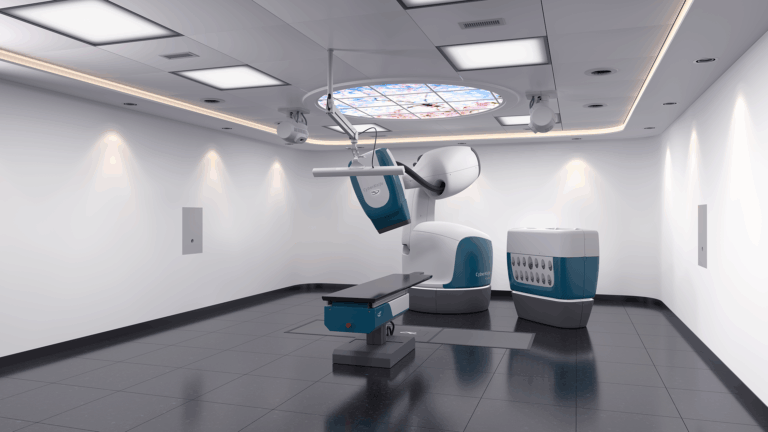
During the International Stereotactic Radiosurgery Society (ISRS) Meeting held in Geneva in June 2025, leading clinicians shared their experiences and research on the CyberKnife® System. Their interviews offer invaluable perspectives on how Accuray technology is advancing treatment for tumors anywhere in the body. Here are the highlights from each expert, reflecting the system’s clinical impact and precision.
Precision in Spinal and Intracranial Tumor Treatment
During the Accuray symposium, Dr. Felix Ehret and Prof. Marcello Marchetti discussed the transformative role of the CyberKnife System in treating intramedullary spinal metastases and arteriovenous malformations (AVMs). Dr. Ehret emphasized the system’s ability to deliver targeted therapy for spinal tumors, while Prof. Marchetti showcased how the system can deliver plans using the Brainlab Elements software to enhance the target definition for radiosurgery treatments for AVMs. Their insights underscore the CyberKnife System’s versatility and its capacity to address challenging cases with accuracy.
Establishing Guidelines for Benign Spinal Lesions
Prof. Marcello Marchetti presented a systematic review commissioned by ISRS, aiming to define clear guidelines for the surgical management of benign spinal lesions. He highlighted the importance of standardized protocols to ensure regulatory compliance and optimal patient outcomes across Europe and beyond. While the current evidence base is limited, ongoing research promises to refine these guidelines and further improve clinical practice.
Radiosurgery as a Primary Treatment Modality
Prof. Marchetti also shared his broader clinical experience, noting that radiosurgery—particularly with the CyberKnife System—can serve as a primary treatment for certain spinal and intracranial tumors. He explained that, although surgery is often possible, radiosurgery offers a less invasive alternative with promising long-term results. The CyberKnife System’s ability to efficiently treat spinal lesions, even in the absence of precise spinal cord constraints, is especially noteworthy. Marchetti’s experience suggests that the CyberKnife System is an advanced device, expanding the indications for radiosurgical treatment.
Long-Term Outcomes in Glomus Tumor Management
Dr. Zeno Perini shared his center’s 22-year experience with the CyberKnife System, focusing on the treatment of glomus tumors. Over two decades, his team has treated many cases, often following embolization, and achieved high rates of tumor control and tumor volume reduction. Dr. Perini emphasized the advantages of the CyberKnife System over traditional surgery, particularly in helping minimize neurological deficits and improving patient quality of life. His data, including long-term follow-up, demonstrates the CyberKnife System’s efficacy in managing complex central nervous system pathologies.
Medical Advice Disclaimer
Accuray Incorporated as a medical device manufacturer cannot and does not recommend specific treatment approaches. Individual results may vary.
Safety Statement
Most side effects of radiotherapy, including radiotherapy delivered with Accuray systems, are mild and temporary, often involving fatigue, nausea, and skin irritation. Side effects can be severe, however, leading to pain, alterations in normal body functions (for example, urinary or salivary function), deterioration of quality of life, permanent injury and even death. Side effects can occur during or shortly after radiation treatment or in the months and years following radiation. The nature and severity of side effects depend on many factors, including the size and location of the treated tumor, the treatment technique (for example, the radiation dose), the patient’s general medical condition, to name a few. For more details about the side effects of your radiation therapy, and if treatment with an Accuray product is right for you, ask your doctor.
